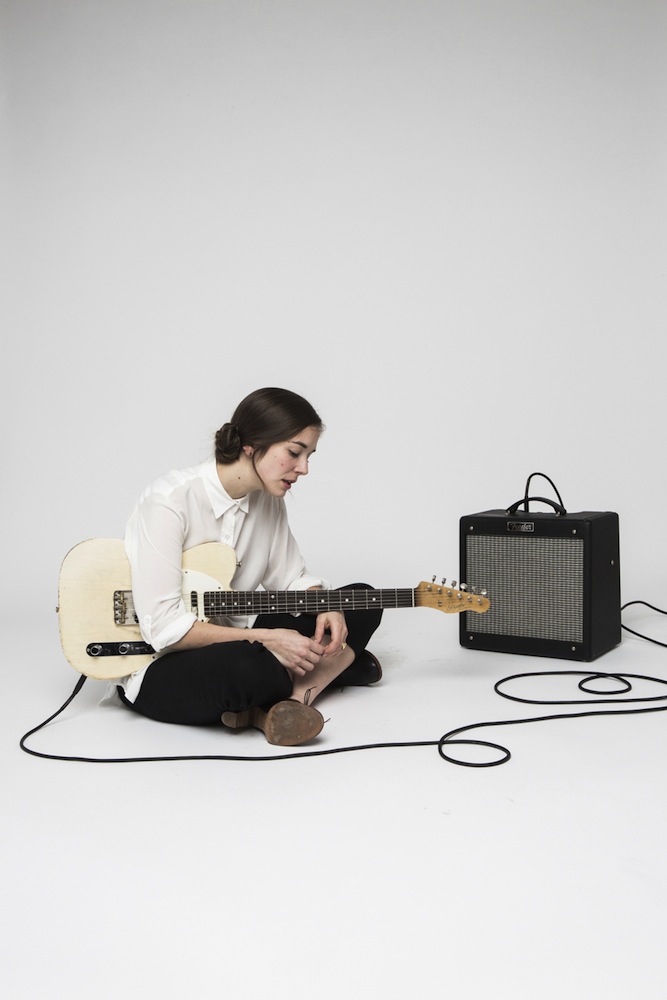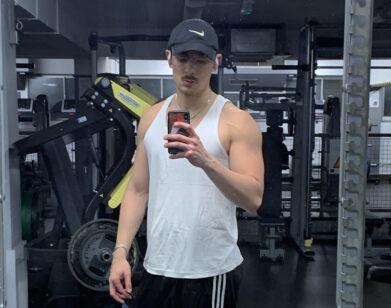Discovery: Margaret Glaspy

Listening to Margaret Glaspy’s debut LP Emotions and Math is, quite simply, satisfying. Her voice is at times round and full and at others raspy, commanding your attention and occasionally summoning a knowing smile. The songs are filled with pithy lyrics and mature melodies. “You and I,” the third song on the album, begins, “Oh, tonight I’m a little too turned on to talk about us / And tomorrow I’ll be too turned off and won’t give a fuck / About you and I / I don’t wanna see you cry / But it feels like a matter of time.”
While the lyrics seem as though Glaspy kicked open the door to a confessional booth mid-story, her songwriting process is methodical. “I was about 15 when I started to write songs,” she tells us over the phone. “Like a lot of writers, I keep a personal archive of my ideas. Then often I’ll be influenced by other songwriters. I’ll hear a song—more often than not it’s taken from mainstream pop music—and hear forms that I like or use them as a skeletons for songs of my own, in terms of the order the verses, choruses, and bridges come,” she continues. “I’ll plug my own ideas into it and by the end of the song it’s completely different. It provides a base for me start in and then I’ll go from there.”
After attending the Berklee College of Music for one semester before dropping out, Glaspy spent time in Boston working and performing. In September 2010 she made the inevitable move to New York. “Since I was a tiny girl I knew I was going to live in New York,” she says. “It was a dream of mine. Living in Boston, it was so close. It just felt like, ‘Why not take the opportunity?'” After six years in the city spent babysitting and, at times performing two shows a week, she planned to release Emotions and Math via Bandcamp, but luckily, ATO Records picked up on her music and released the LP last month. Now, she says she “tours constantly,” and tomorrow, she’ll perform at the Bootleg Theater in Los Angeles.
NAME: Margaret Glaspy
AGE: 27
BASED: New York, NY
BORN: Red Bluff, CA, two hours north of Sacramento
STARTING OUT ON STRINGS: The fiddle happened before I started to sing. There was [an elementary] school program for it; the most developed music program was for the fiddle so I just went for it. I dropped the fiddle when I was 15 or maybe 16. That overlapped with me singing. Probably around 13 or 14 I started to sing the songs I was playing on the fiddle, all of this spoken material. By the time I was 16 I was totally immersed in singing and playing guitar.
My family is all total guitar nuts—everyone has a guitar. It’s interesting because it’s kind of casual in that no one else plays music for a living, but there are guitars all around and there always has been. My whole family is really passionate about music; that was already in my blood from the very beginning. In playing the fiddle there’s also a total guitar community around it. Wherever you’re playing the fiddle you want other people to play with you, like guitar players do. I started to do that when I played the fiddle.
When we’d be around the campfire my family would all play together. We were a camping family when I was young. At home—I see it now as such a special environment—someone would be on the couch playing the guitar and someone else would pick one up and start strumming along. That was the vibe in the house.
RECORDS SPINNING: There was Joni Mitchell’s Blue. That was a big one that was played [while I was growing up] all the time. Michael Jackson’s Thriller was a big record in the house. There was an Ella [Fitzgerald] and Louis Armstrong record that got played a lot as well.
I listened to a lot of music while I was making this record. Elliot Smith was definitely on in the background—XO, Figure 8, Roman Candle—those were the records I was listening to at the time.
EMOTIONS AND MATH: It was wrapped into a song I was working on and it ended up being the title I chose. It felt pretty fitting to call the record Emotions and Math because I was making something emotive that’s super process driven, being analytical about it all. I suppose the through line in the album is cutting off all the excess from everything lyrically and musically—instrumentation wise, production wise.
I joke that the album took 27 years to make because I feel like I would always be whittling away the excess and working towards the first record. In some way it felt like those 12 songs were there for that record, like there was nothing else, but really I’ve been writing a lot of different material and weeding away a lot for the last six or seven years. It was definitely taken out of a big pool but it was a slow process in terms of stripping everything away.
THE OBJECTIVE APPROACH: I would argue [the songs are] not autobiographical or from my diary, only because I approach the whole songwriting process pretty objectively. I think that it’s really fun to hear people’s perspectives on the songs because often they’re argued as being straight from my life. A lot of them are kind of character studies or taking something I’ve seen a thousand times, honing in on it, and capturing it in a certain way. I’m not bashful with songwriting because I don’t think there’s anything to be bashful about in a lot of ways; it’s a craft and some of the lyrics are me being vulnerable and a lot them aren’t really.
TESTING THE WATERS: When I come up with a new song I usually play it for an audience. That’s my process in terms of it being seasoned or me realizing it needs more work; it’s just seeing how it feels to be played live.
THIRD TIME’S THE CHARM: When I first made the record I demoed all of the songs on an iPad; that was the first go around. After that, my boyfriend and I got some recording equipment. I set that up inside my apartment and essentially recorded all the songs on my own gear and thought that was going to be the record. When I was finishing up that process ATO Records reached out to me and asked me if I wanted to make a record. That gave me the opportunity to make it the way I thought it should be made; being able to record with other musicians live and have a full drum kit and things like that, those are things I don’t have in my own apartment. It was nice to have that opportunity and the resources to do it.
[The songs] changed production wise, just because increasingly I got nicer and nicer equipment. I started out very lo-fi and then came into a different place by the end of it. The bones of the songs stayed the same, although they also evolved quite a bit too, the words and lyrics and things like that. I had a lot of time and space and energy to really get them where I wanted them because there wasn’t really a ticking clock as much in the end when ATO got on board.
DROPPING OUT: I think it was a complicated time because I did want to stay [at Berklee] but I knew I couldn’t afford it. I knew also it was a different opportunity to be in Boston and have all that time to myself to explore. I was working jobs then. I didn’t have all the time in the world to myself, but it afforded me an amount of exploration. I was really hungry for my own way and by default I had to have my own way. Everyone has their own way but [mine] wasn’t going to be aided by the architecture that school provides. I look back on it and I’m really happy for it.
I feel like [being in school] was a big process in learning how to play music with other people. It was a really humble experience that I’ll take for the rest of my life. Just seeing that there are so many other people that want and are doing the same thing that I was doing at a young age, I carry that with me all the time now and I know that, “Sure, I wrote some songs and made a record, but that’s been happening for a really long time and that will continue to happen after me.” I’m proud of the record, I think it’s really special, but it’s also not that special being surrounded by thousands and millions of other records.
TAKING THE STAGE: I think when I was a teenager, around 16 or 17, I knew I was going to do music as my profession. There were other things that were mingling in the background, like I thought I was going to be an actress around the same time as well. I acted a lot as a young person. I think I’ll probably try to get into that again sometime in my adult life. I was putting all my eggs in that basket for a while. Then when music came along, I accepted that as well. I think I always knew I was going to do something in the performing arts, or just the arts in general.
Acting I find interesting. I think there’s a rush about it, the actual experience of being on stage and playing someone else is like no other. There’s also something about music and always playing myself. In acting I feel like there’s a different way of being on stage and I’m attracted to that for sure.
PLAYING LIVE: You’re playing the same material most nights but there’s a certain kind of enjoyment that comes in finding something special in the same thing. You can make it lively even when you know the song. It’s also a challenge in terms of improvisation, trying to have the spontaneous moments in something you know to be tried and true. It’s a cool process and also challenges me musically; I’m excited about it.
FOR MORE ON MARGARET GLASPY, VISIT HER FACEBOOK.






